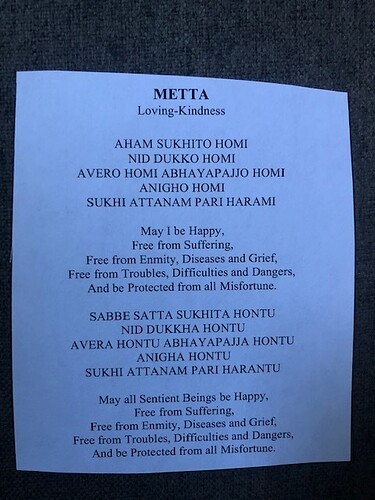In the chant “Reflection on Universal Well-being” (in the Forest Saṅgha chanting book), the verses for self and others are the same except that the second verse omits what would be “niddukkhā hontu.”
Ahaṃ sukhito homi
Niddukkho homi
Avero homi
Abyāpajjho homi
Anīgho homi
Sukhī attānaṃ pariharāmi
Sabbe sattā sukhitā hontu
Sabbe sattā averā hontu
Sabbe sattā abyāpajjhā hontu
Sabbe sattā anīghā hontu
Sabbe sattā sukhī attānaṃ pariharantu
Can anyone say why this is omitted?
I’ve always assumed that it’s because the wish that all beings be free from dukkha is addressed separately in the very next part:
Sabbe sattā sabba-dukkhā pamuccantu
Why the first part, where oneself is the subject, only seems to cover good will and compassion, omitting gladness and equanimity, I don’t know.
2 Likes
I suppose because we’re automatically glad at our own good, so this hardly requires a special effort to cultivate. And I read the lines on equanimity as applying to all beings, myself included.
2 Likes
Don’t we also automatically wish to be free from suffering?
And wouldn’t all the parts that mention all beings apply to oneself too?
Maybe the first part is just tuning the instruments a bit before unleashing the full symphony?
1 Like
Good point. “May I not be parted…” is also dangerously close to clinging perhaps?
Yeah, that’s more like it! 
1 Like
Part of why I ask is that a student of mine has a version of this chant from a different lineage (a Mahasi school) that does include niddukkhā hontu.
What’s the origin of this chant? I don’t see it in the notes on the file the way some of the other canonical texts have the sutta location included.
